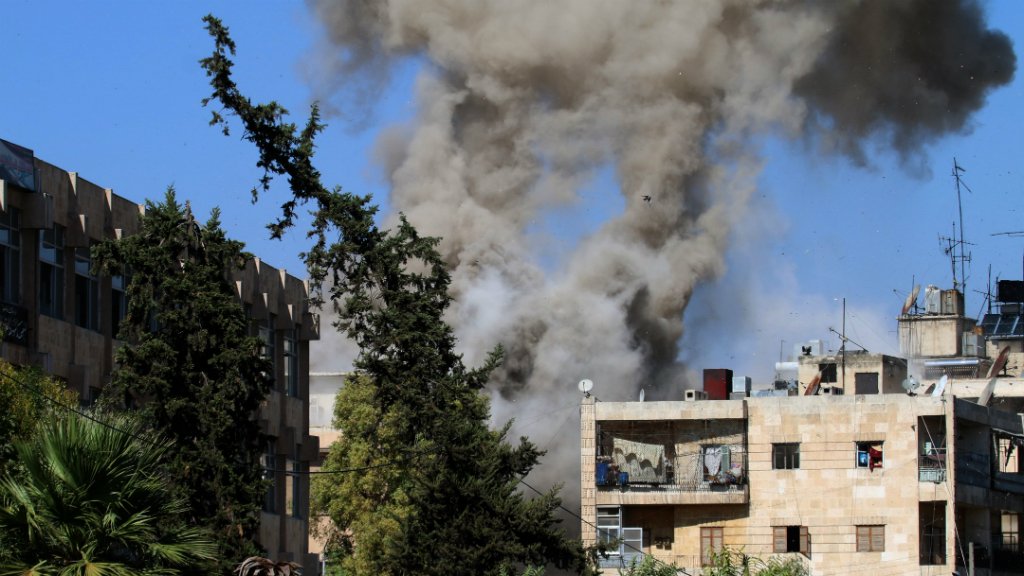Paris- French President François Hollande had recently made a clear statement on the options on sanctioning Russia for its Aleppo war crimes remain wide open. Hollande also urged using any means necessary for prolonging the existing ceasefire, delivery of humanitarian aid and return to negotiations.
Achieving political transition in the war-torn country remains directly linked to successful negotiations.
Russia’s Tuesday halt of airstrikes on Syria’s largest city, Aleppo, for an eight-hour cease-fire invoked memories of Chechen Grozny’s decimation.
Russia’s scorched-earth campaign in Aleppo over the past month to eliminate opposition to its ally, the head of the Syrian regime, Bashar Assad, remains very similar to its approach in Grozny some 16 years ago. That campaign came as part of an effort to wipe out Chechen separatists, and the evacuation offer turned out to be a deadly trap.
In February 2000, the Russian military offered the Chechen rebels safe passage out of Grozny. But that corridor, which led to the village of Alkhan-Kala three miles away, turned out to be a Russian minefield that killed hundreds of rebels as they tried to escape.
The European Union imposing economic sanctions on Russia faces three chief obstacles, a unanimous EU concession, which is absent—France continues to prove unenthusiastic towards pushing forward with sanctions, whilst Germany remains undecided.
More so, passing sanctions takes up great processing time and never ending barter, especially that Russia is the country on the other end of the table.
Economic sanctions against Russia are futile on the short run and will not have any effect until a considerable amount of time had passed.
Despite economic sanctions proving effective for Iran’s nuclear power, allowing a deal to be brokered, parallels cannot be drawn in Russia’s case, senior analysts said. Sanctioning Moscow for Crimea amounted to no radical change in its policy or had stopped it the peninsula’s annexation by the Russian Federation.
The Ukrainian territory of Crimea was annexed by the Russian Federation on 18 March 2014. The annexation was preceded by a military intervention by Russia in Crimea, which took place in the aftermath of the 2014 Ukrainian revolution and was part of wider unrest across southern and eastern Ukraine.
“What is happening in Aleppo is a war crime, one of the first demands is that the bombardments by the regime and its (Russian) backers must end,” Hollande said after a meeting between the three leaders in Berlin.
Alternatively, German Chancellor Angela Merkel condemned the air raids on Syria’s second city as “inhumane and cruel”.
Both leaders warned that they could not exclude imposing sanctions on Russia, hours ahead of an EU summit where Russia’s role in Syria is set to be discussed.
Merkel and Hollande chose to focus on Russia’s role in the Syrian conflict, claiming that Moscow bears “responsibility” for the start of the political process in Syria.
Hollande in turn called what is happening in Aleppo “a real war crime,” calling for “maximum” pressure to be exerted on Russia.
Western powers expect that Moscow will put more pressure on Assad to stop the bombing of Syrian Opposition moderate forces controlling eastern Aleppo.
Aleppo, held by rebels determined to oust Assad, has come under heavy bombardment since the Russian-backed military announced an offensive in late September to regain control of the east.
Air strikes there have flattened numerous residential buildings and civilian facilities.
Despite being absolutely convinced that Russia needs to be pressed on to step-down its military campaign in Syria, European media outlets now direct public interest towards pushing for sanctions against pro-regime Syria companies and institutions, not Russia.
